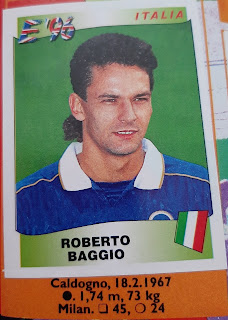428: Paolo Di Canio, Sheffield Wednesday, Merlin’s Premier League 99 Official Sticker Collection
Today Emlyn Jones bravely takes a look at a man who combined football wizardry with political fanaticism in a way which only he could have managed. To say the very least today’s subject went a bit further than slagging Jacques Chirac off on a bed sheet and don’t get him started on Robot Wars: "Robot Wars is not a sport. Guys just play with remote controls. Now, if they were wired up and got an electrical shock each time their robot got hammered, then, yes, it would be a sport." Quite. Over to Emlyn.
Politics and football are two oft-separate worlds that occasionally collide; several former players have gone on to stand for and indeed hold office, including Romario, Theo Zagorakis, Andriy Shevchenko and George Weah. It's rare for players to declare allegiance to a political party or philosophy during their playing days, though by no means unheard of, not least in the Italian leagues. The views espoused have traversed the entire political gamut, from dedicated communists such as Cristiano Lucarelli, to self-styled fascists like Christian Abbiati. Others hinted at their views without outwardly stating them; such as Gigi Buffon, who has worn slogans associated with various right-wing organisations and briefly wore shirt number 88. Google can explain that connotation. Today's subject was unabashed about revealing his political leanings; an ideological and occasionally tactical right-winger. Whether for actions off the field, on the field, or being ordered off the field, you could be sure it wouldn't be long without him being the subject of attention.
Paolo Di Canio was born in Rome in 1968, growing up in the working-class Quarticciolo district. The youngest of four brothers, Paolo recounts a childhood squabble that ended with him plunging a fork into his brother's back, and overcame both leg problems and a cola addiction that left his liver almost doubled in size. Despite these adversities, Di Canio signed for Lazio aged 13, and debuted in 1988, netting a winner in the Rome derby in his first season. Through his time in the youth teams he had also been a member of a fan group with subsequent links to far right groups.
In 1990, with the club seeking to refresh the squad, Di Canio was sold to Juventus, however, their stacked squad featuring the likes of Baggio, Ravanelli and Vialli meant that playing time was limited. This culminated in a row with manager Giovanni Trapattoni, and Di Canio was moved to Napoli on loan for a year. His contract having expired, he then moved on to AC Milan. Again, competition for places was fierce, and a falling out with Fabio Capello meant that by 1997 another move was looming.
The next transfer for Di Canio would see him pull on the green and white hoops of Celtic. He was an immediate hit, despite chasing pescophobe club captain Peter Grant around a hotel with a dead salmon, and would win the Player's Player of the Year award after fifteen goals in his debut season. Sadly, a contract dispute put paid to his time in Glasgow, continuing a theme of acrimonious departures, and Di Canio moved on to Sheffield Wednesday.
Mildly questionable pasta themed photos with Benny Carbone aside, Di Canio was welcomed warmly to Sheffield, despite his comments about the city centre itself. He performed well for the side, despite a changing room row with Ron Atkinson, ending his first season as top scorer. However, a game against Arsenal in September 1998 changed everything. Following a spat with former Milan teammate Patrick Vieira, and a tussle with Martin Keown, Di Canio was shown a red card. Frustrated, he pushed referee Paul Alcock away, the official taking a slow motion tumble. He was vilified, banned for eleven matches and would ultimately never play for Wednesday again.
Famed wheeler-dealer Harry Redknapp decided to take a risk, signing Di Canio for West Ham United for a £1.7m fee. Despite having missed half the season, he was the OPTA Player of the Year 1998/99, and continued his fine form into the next season, scoring a spectacular goal against Wimbledon. Leaping into the air and leaning backwards to volley the ball across the goal, the strike would later be voted goal of the decade. In December 2002, with the score level in a tense game against Everton, Toffees goalie Paul Gerrard collapsed with a knee injury. With the ball arcing into the penalty box, Di Canio stretched his arms out and grabbed it, ensuring the stricken goalie could be tended to as soon as possible. From villain of the country to a FIFA fair play award, redemption was complete. Sir Alex Ferguson even made an attempt to sign Di Canio in 2001, but was rebuffed.
Di Canio's time at West Ham ended after the 2002/03 season culminated in relegation, though not before a public falling out with manager Glenn Roeder. Di Canio moved on to Charlton Athletic for a season, before returning to cash-strapped Lazio. He endeared himself somewhat too much to the fans, flashing a 'Roman' salute to the supporters after scoring in the Rome derby, and again aligning himself with the 'Ultras' in the support. As a result of this, and several fallings out with staff, he moved on to Cisco of the fourth tier, where after two seasons, he retired.
Di Canio moved on to management, first with Swindon Town. Despite a pitchside scrap with Leon Clarke, the first season was a success, with the club winning League Two. However, financial issues hit in the next season. Despite Di Canio offering his own money to keep loan players, and helping clear the pitch alongside supporters to ensure a game could be played to earn revenue, he eventually resigned due to the off field issues. Two months later, he took over at Sunderland, tasked with keeping them in the Premier League. David Miliband resigned as vice-chairman in protest at his prior statements, however, the side managed to secure safety with a game to go. He managed only five games of the following season before being sacked, with the squad hugely changed and several players reportedly complaining to the board. Di Canio hasn't held a managerial role since.
Paolo is a pretty complex figure, with controversy never having been far away, but it's impossible to argue with the notion that he's a huge part of the Premier League story. It's inarguable that he has very strong principles, regardless of where you sit on the political spectrum. It's likely that his political views have hindered his managerial career, but who knows what the future holds.





this blog provides us with much informative data related to people in the world via stickers.
ReplyDelete